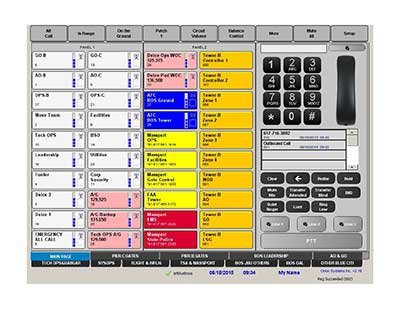Radio Dispatch Solution Used by Service Techs Now Use IP Based Systems

In an age where connectivity is king, service-based organizations such as cable installers, residential HVAC repair crews, and utility technicians have witnessed a significant transformation in how they manage logistics. Traditional analog radio communication systems are making way for advanced IP-based radio dispatch systems that offer greater efficiency, versatility, and cost savings. In this blog post, we will explore the world of IP-based radio dispatch systems, their benefits, and how organizations can transition from older analog units to embrace this cutting-edge technology.
The Evolution of Communication in Service-Based Industries
Service-based organizations are the backbone of modern society, ensuring that essential utilities are maintained and delivered effectively. From cable installers ensuring that homes are connected to the digital world to HVAC technicians providing comfortable indoor environments, seamless communication is vital to these professionals' daily operations.
Traditionally, these industries have relied on analog radio communication systems to coordinate their workforce. However, with the rapid advancement of technology, the limitations of analog systems have become increasingly apparent. This has led to a paradigm shift towards IP-based radio dispatch systems that leverage the power of the internet and digital communications.
According to a study conducted by the International Wireless Communications Expo (IWCE), service-based organizations are increasingly adopting IP-based solutions due to the enhanced functionality and flexibility they offer in managing field personnel. Ref: https://iwceexpo.com
The Federal Communications Commission (FCC) also recognizes the potential of IP-based radio dispatch systems to provide improved interoperability and more efficient spectrum use. Ref: https://www.fcc.gov
The Power of IP-Based Radio Dispatch Systems
IP-based radio dispatch systems harness the capabilities of the internet and digital networks to deliver a host of benefits to service-based organizations. In most cases, the radio dispatch consoles are the most essential components in that communication system. Various industries such as public safety, transportation, utility, and service-based organizations are jumping on board this race to digitize. The consoles serve as the central hub for managing and coordinating radio communications. These IP consoles enable real-time communication, location tracking, and data sharing, ensuring that field personnel can work more effectively and efficiently. Here's a closer look at some of the key advantages:
1. Enhanced Communication: IP-based systems allow for crystal-clear voice communication and the ability to transmit important data, such as work orders, photographs, and documents in real time. This ensures that technicians have all the information they need at their fingertips.
2. Location Tracking: With GPS integration, dispatchers can track the exact location of field personnel, optimizing routing and resource allocation. This minimizes travel time and improves response times.
3. Multichannel Support: Unlike analog systems that are limited to a single channel, IP-based systems support multiple channels, enabling simultaneous communication on different topics, improving overall coordination.
4. Scalability: As organizations grow, their communication needs evolve. IP-based systems are highly scalable and can easily accommodate the addition of new users and features.
Hardware Components of IP-Based Radio Dispatch Systems
IP-based radio dispatch systems are comprised of several hardware components that work together to create a seamless communication network. These components include:
1. Digital Radios: Digital radios are designed to work over the internet or private IP networks. Older analog radios can be used with the right RoIP gateway but newer digital radios are preferred. They offer enhanced features such as Wi-Fi connectivity, text messaging, and GPS tracking.
2. Dispatch Consoles: The radio dispatch consoles serve as the central control hub for dispatchers to manage communication channels, monitor field personnel, and coordinate activities.
3. Infrastructure: IP-based radio systems require a robust IP network (WAN, LAN or fiber backbone), including servers, routers, and switches to support data transmission and connectivity.
4. Accessories: Headsets, microphones, and chargers are essential accessories that enhance the usability and functionality of IP-based radios.
Transitioning from Analog to IP-Based Systems
Many service-based organizations still have significant investments in analog radio units. The transition to IP-based systems can be a gradual process, and there are cost-effective ways to incorporate newer technology without discarding existing analog radios.
By using bridging solutions, organizations can seamlessly connect their older analog units to IP-based systems. This interoperability allows them to leverage their existing infrastructure while gradually introducing newer digital mobile radios as needed. This phased approach helps organizations realize substantial cost savings and ensures a smoother transition.
Interoperability and Compatibility
The term "interoperability" is crucial when discussing the integration of different devices within Interoperable communication systems. Interoperability refers to the ability of various components, often from different manufacturers, to work together seamlessly.
To ensure interoperability, organizations must consider the use of standard protocols and open interfaces, as well as choose vendors that prioritize Interoperable communication systems compatibility. This approach ensures that different devices and systems can communicate effectively, enabling smoother operations.
The Importance of Communication System Providers
The transition to IP-based radio dispatch systems is revolutionizing the way service-based organizations manage logistics. The benefits of enhanced communication, location tracking, and scalability are undeniable. Moreover, the ability to integrate existing analog radios offers cost-effective solutions for organizations looking to embrace this technology without immediately discarding their old equipment.
However, it's crucial to highlight the significance of working with communication system providers during implementation. These providers have the expertise to assess an organization's specific needs, design a tailored solution, and provide ongoing support to ensure the system's success.
As service-based industries continue to evolve, it's clear that IP-based radio dispatch systems will play a pivotal role in their success. The ability to stay connected, communicate effectively, and adapt to changing demands ensures that these organizations can continue delivering essential services with the utmost efficiency and reliability. Embracing the future of communication is not just an option; it's a necessity for the modern service industry.